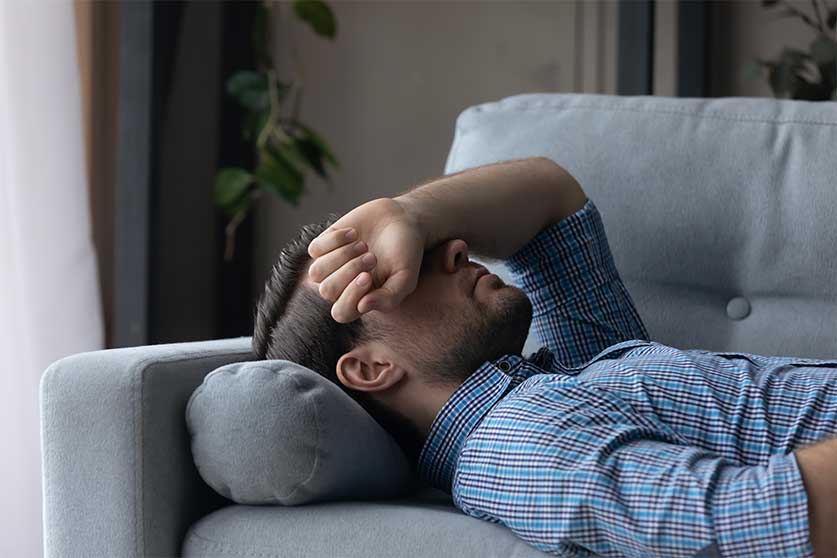Marijuana Withdrawal Symptoms | Timeline & Treatment

Medically Reviewed By: Manish Mishra, MBBS
After a period of repeated use, marijuana withdrawal symptoms may begin less than a week after the drug is abruptly stopped. Symptoms likely consist of cravings for the drug, depression, and sleeping difficulties.

Cannabis, also referred to as marijuana, is a schedule I drug on the controlled substance list according to the United States Drug Enforcement Administration (DEA). It has a high potential for abuse.
Cannabis withdrawal may cause anxiety, cravings, irritability, and other symptoms. For those who use the drug long-term or take large quantities of the drug, serious health problems may occur.
Medical cannabis is used by some to assist with certain health conditions. Despite this, the drug continues to be sold illegally and can be abused.
Symptoms Of Marijuana Withdrawal
Although marijuana withdrawal may not be life-threatening such as the withdrawal from benzodiazepines, alcohol, and illicit drugs including certain opioids, it can still create a number of serious health problems.
If a person is suffering from marijuana withdrawal, they may struggle with a number of symptoms.
In fact, according to the Substance Abuse and Mental Health Services Administration (SAMHSA), some of the marijuana withdrawal symptoms consist of both physical and psychological symptoms:
- cravings for the drug
- sleep disturbances
- irritability
- nausea
- weight loss or changes in appetite
- shakiness
- anxiety
- depressed mood
- sweating
- stomach pain
These psychological and physical symptoms can both cause serious side effects such as severe abdominal pain, tremors, or mood swings.
Side Effects Of Marijuana Use
When a person partakes in marijuana use, the cannabinoid delta-9 tetrahydrocannabinol (THC) acts upon the brain receptors and is responsible for providing the sedative side effects which occur. THC is the active ingredient found in the marijuana plant.
If you smoke marijuana or use other cannabis products such as marijuana edibles, the substance will cause a number of side effects.
According to the National Institute on Drug Abuse (NIDA), the use of marijuana may produce side effects such as:
- feelings of euphoria or sedation
- changes in mood
- impaired memory
- altered sense of time
- difficulty thinking
If a person continues to take marijuana in high doses, they can also experience hallucinations, psychosis, and serious delusions.
Smoking marijuana long-term can increase the risk of lung damage.
Timeline Of Marijuana Withdrawal
To first develop cannabis withdrawal symptoms, a person must participate in marijuana use. Once they stop using it, they may experience symptoms less than one week later.
How long withdrawal symptoms last depend on frequency of use, potency, and the amount of marijuana a person used.
Withdrawal symptoms are likely to peak around 10 days after discontinuation, but may persist due to cannabis withdrawal syndrome.
Cannabis Withdrawal Syndrome
Cannabis withdrawal syndrome (CWS) is the result of cannabis use disorder (CUD) and dependence.
CWS may include continued withdrawal symptoms like sleep difficulties, nausea, and an elevated heart rate.
If a person is struggling with a substance use disorder and abruptly stops taking the drug, the withdrawal syndrome may occur which will likely require a treatment plan.
Marijuana Addiction Treatment
If you or a loved one are struggling with substance abuse, consider finding a treatment center. Addiction treatment programs offer a number of options for marijuana abuse.
Detox
Through the detoxification process, your body will rid itself of the harmful toxins caused by the drug abuse. Throughout the process, your healthcare provider or medical professional will monitor you in a safe and secure environment.
Inpatient/Outpatient Care
Inpatient treatment and outpatient treatment allows a person to decide which option best fits their needs. Addiction centers offer a variety of options such as intensive outpatient treatment, partial hospitalization programs, and long-term residential care.
Group Therapy
Addressing behavioral health is important for substance abuse treatment. Group therapies, including support groups, provide peer support within a structured schedule. Group therapy is the foundation of many addiction treatment programs.
If you need help overcoming unhealthy drug use, please contact us today for information on our inpatient treatment options.
- Dove Medical Press: Substance Abuse and Rehabilitation https://www.ncbi.nlm.nih.gov/pmc/articles/PMC5414724/
- National Institute on Drug Abuse https://nida.nih.gov/publications/drugfacts/cannabis-marijuana
- National Library of Medicine: MedlinePlus https://medlineplus.gov/marijuana.html
- National Library of Medicine: MedlinePlus https://medlineplus.gov/ency/patientinstructions/000796.htm
- Substance Abuse and Mental Health Services Administration https://store.samhsa.gov/sites/default/files/d7/priv/sma15-4131.pdf

